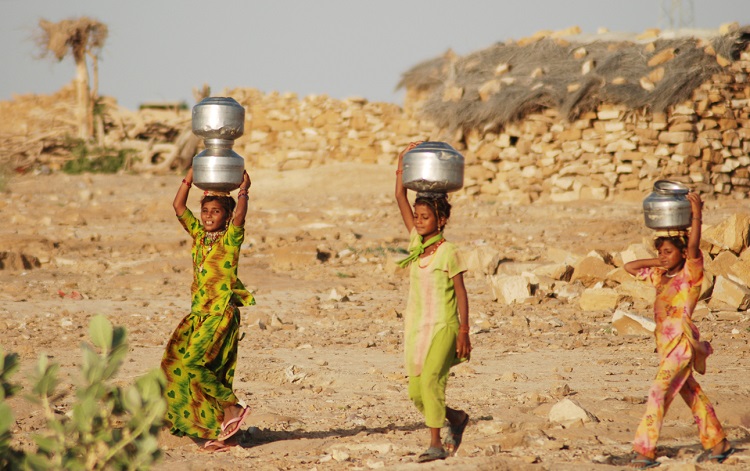
Gender inequality doesn’t link to sustainability!
By Charlotte Carding
Many people may think that gender inequalities impact climate change is a far-fetched idea. I mean how can the two be related? However, contrary to popular belief, there has been substantial evidence that shows they do!
Gender inequality has been a major social issue throughout the late 20th and early 21st century, discussed and debated by scholars, the public, and celebrities alike; however, many arguments focus on the global North and how gender equality has progressed, ignoring the issues of the global South. Meinzen-Dick et al. discuss the relationship of sustainability and females, citing many studies showing how women’s involvement can impact the environment and focusing on the previously overlooked global South (2014). Ecofeminists believe that women are more likely to be harmed by the degradation of nature and climate change due to a biological relationship with nature to reproduce (Biehl, 1991). Scholars have more recently been focusing in their research on the role of gender in sustainability and the environment, which can help the public in their lives by showing us what we can do to progress gender equality and help the environment.
Studies are now more frequently appearing on the relationship between gender and the environment, one being Westermann et al. who compared 46 different gender-differentiated social groups in 20 countries, showing that when women were more present in natural resource management, collaboration, solidarity, and conflict resolution increased (2005). It may surprise you to learn that women and men have been shown to have different preferences as to what they prioritise in their lives, especially those who work as e.g. farmers (Meinzen-Dick et al., 2014). German et al. showed that women and men had different priorities in Tanzania, with women valuing drinking water and wanting to plant trees with more domestic use value, and men prioritising irrigation water and planting trees with cash value (2008). As you may realise, both of these pieces of research I have mentioned could have important applications on both the global South and the global North. Westermann et al.’s (2005) research could be applied into the instruction to have mixed-sex groups when working with the environment due to the important traits both genders can utilise. German et al.’s (2008) research can be applied in showing the difference between men and women’s preference as to their priorities in research management, again supporting mixed-sex work groups, as well as showing why certain groups prioritise certain resources.

Women farming in India (photo: Wikimedia)
All over the world, but especially in the global South, women own less land than men. This is for many reasons, including sexism, whereby it is seen as a man’s role to have control of land, however this again has implications on the environment and sustainability. Meinzen-Dick et al. shows that when women have less secure land rights they are less likely to adopt long-term farming practices, such as shortening crop rotations (2014). Women are rarely in positions of sufficient political power to be confident in their land rights, so they tend to fallow plots less often and for shorter periods of time than their husband, therefore producing less yield (Meinzen-Dick et al., 2014). Fortmann et al. completed a study in Zimbabwe, which found that the potential of a woman losing her land following widowhood, or divorce, is a main source of insecurity, limiting the amount of planting they partake in (1997). This evidence shows that strengthening women’s land rights, for example through land certification programs, would associate with a higher adoption of sustainable framing techniques for women, therefore increasing their overall yield as well as helping the environment. This type of program has associations with political power, which is why it is important to increase global political participation for females as to increase their representation in politics and help women worldwide. Political representation is a very current issue which we deal with in the global North, however in the global South this can also increase global sustainability and equality due to female impact on farming and sustainability; thus, advantaging the global population.
Therefore, it is clear to us that that sustainability and gender equality have important impacts globally! Gender links to every aspect of our lives, and it is therefore important to not only shed light on first-world gender issues such as representation in politics and business, but also on the global South, as their inequality issues also affect us. After reading this blog post I hope that you have a new understanding of what it means to be all-inclusive, we cannot just focus on issues facing us, but we must do what we can to help others, as well as our environment, to ensure a more equal and sustainable future!
- Biehl, J., (1991) Rethinking ecofeminist politics, Boston: South End Press.
- Fortmann, L., Antinori, C. and Nabane, N., (1997) ‘Fruits of Their Labors: Gender, Property Rights, and Tree Planting in Two Zimbabwe Villages 1’, Rural Sociology, 62(3), pp.295-314, [Online]
- Available at: https://doi.org/10.1111/j.1549-0831.1997.tb00653.x (Accessed: 8/3/19)
- German, L., Mazengia, W., Ayele, S., Tirwomwe, W., Tanui, J., Taye, H., Begashaw, L., Nyangas, S., Chemangeni, A., Cheptegei, W. and Tsegaye, M., K. Bedane. (2008), Enabling Equitable Collective Action & Policy Change for Poverty Reduction and Improved Natural Resource Management in the Eastern African Highlands. CAPRi Working Paper 86, Washington, DC: International Food Policy Research Institute.
- Meinzen-Dick, R., Kovarik, C., & Quisumbing, A. R. (2014). ‘Gender and Sustainability’ In Gadgil, A and Liverman, DM (Ed.), Annual Review of Environment And Resources, VOL 39 (Vol. 39, p. 29-48).
- Westermann, O., Ashby, J. and Pretty, J., (2005) ‘Gender and social capital: The importance of gender differences for the maturity and effectiveness of natural resource management groups’, World Development, 33(11), pp.1783-1799 [Online]
- Available at: https://doi.org/10.1016/j.worlddev.2005.04.018 (Accessed: 8/3/19)

0 Comments